Oscar Roundtable: Meet This Year's Best Documentary Feature Nominees
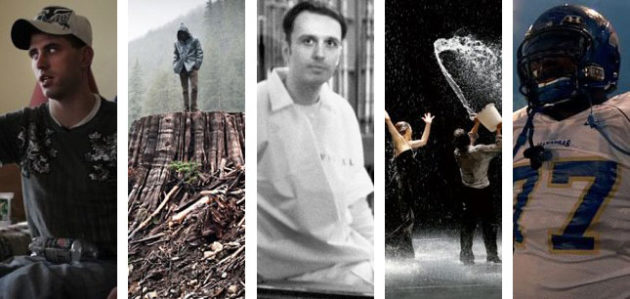
I'm thrilled and honored to welcome you to the first of several virtual roundtables featuring Oscar's nominee class of 2012 -- commencing today with those behind the five films nominated for Best Documentary Feature. They are (in alphabetical order):
· Joe Berlinger, co-director (with Bruce Sinofsky) of Paradise Lost 3: Purgatory
· Marshall Curry, co-director (with Sam Cullman) of If a Tree Falls: A Story of the Earth Liberation Front
· Mike Lerner, co-producer (with Martin Herring and director Danfung Dennis) of Hell and Back Again
· Daniel Lindsay and TJ Martin, co-directors of Undefeated
· Wim Wenders, director of Pina
Congrats to them! But now we have some questions. Take a moment to get to know them, their stories, their takes on the race, and, of course, their respective Oscar-night dates.
So in a matter of days, you're taking your film to the Academy Awards. Has it sunk in? How are you feeling about it right now?
BERLINGER: Before awards season began, my wife put her hands on my shoulders, looked into my eyes, and very wisely said to me that there can be no bigger prize than having helped get three innocent men get released from prison after 18 plus years of wrongful imprisonment and therefore I should to ignore the hoopla of the upcoming awards season. It was great advice that I have been trying to keep in my heart and not get caught up in the anxiety of wondering if we will win. In short, I am trying to not think about it. That may change next week when I board the plane for Los Angeles.
CURRY: It's a huge surprise. There were a lot of really great docs this year so you never expect that you'll make the list. I'm mostly excited because it means that more people will watch the film. It's so hard to get people to watch documentaries, and the nomination is a big help in drawing audiences and convincing them that documentaries can feel like movies — with plot twists and drama and characters and emotion — and not just like school lectures. I still have some wardrobe challenges that I need to get sorted out in the next few days.
LERNER: Each morning you wake up and remember that our film has been nominated for an Oscar — and you have to check that you have actually woken up and are not still dreaming.
LINDSAY: I think seeing our producer, Rich Middlemas, standing next to Brad Pitt for the "class photo" at the Nominees Luncheon finally made it sink in. My brain couldn't figure out any other reason why Rich would be standing with Brad Pitt, so my mind finally had to accept the fact that we were nominated. For us, this nomination is really a testament to the people we profiled. If they did not trust us with their stories, we wouldn't be having this conversation. That is what excites me most. More viewers will be introduced to these incredible people simply because the film was nominated. Oh, and meeting Steve Zaillain at the Nominees Luncheon, that was pretty cool, too!
MARTIN: I think the reality of the situation is finally starting sink in. The luncheon was one of the most surreal experiences to date. When I got up to the stands to take the nominee group photo, I found myself eavesdropping on a conversation between two familiar voices. I look behind my left shoulder and I see none other the Steven Spielberg. I look over my right shoulder and I sure enough he's conversing with Martin Scorsese. I thought to myself, "This is completely insane, and why am I even in the same room as these two brilliant individuals?" It wasn't until I noticed that the security wasn't ushering me out of the room when I realized "Wow, this actually happening!" Honestly, I'm completely honored and humbled to be recognized amidst such amazing talent. I've admired individuals like Joe Berlinger, Bruce Sinofsky and Marshall Curry for years and to now recognize them as colleagues is a dream come true.
WENDERS: As I am back in L.A. it certainly has sunk in and I feel excited and try to stay cool, calm and collected.
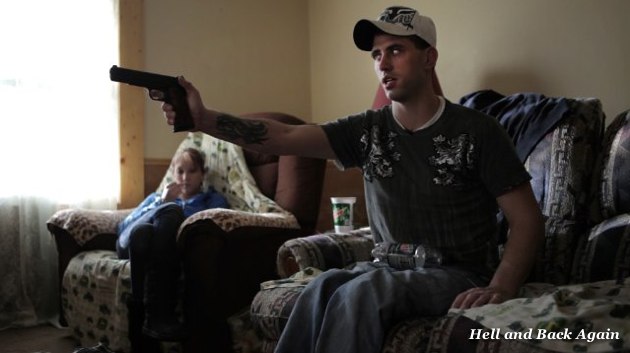
The Oscars are a professional high point for any nominee, but there are always low points on the way. What was the single biggest doubt or challenge that you overcame to make your nominated film?
BERLINGER: Sticking with the same story through three films over two decades has involved a lot of professional and personal commitment. There were many times along the way that it felt like no matter how many people signed on to help, no matter how much exculpatory evidence was uncovered, the State of Arkansas was not going to budge. It's unreal to me that we started this effort when I was 31 and now I am 50 years old, and the West Memphis Three had 18 years of their lives taken from them. I also feel terrible for the parents of the victims of these murders, for whom there is no closure until the real killer or killers are caught. In short, it's been an emotional roller coaster full of highs and lows, but being nominated for an Oscar certainly is one of the great high points of this journey.
CURRY: This film took five years from start to finish and there were a lot of low points. We got rejected from grants and rejected from festivals. We had characters say that they didn't want to let us interview them. The editing was grueling — it was a really difficult film to structure — and we had test screenings early on where the threading of all of the story lines clearly was not working. The good thing is that I've been through this a few times now, and I realize that that's just part of the process. You put your head on the desk for a few minutes, and then you take a deep breath and try to figure out how to solve the problems.
LERNER: The biggest challenge was to make sure that we could honor the subjects of the film appropriately — and chiefly get them to accompany us to the Oscars — which we have finally achieved. So Sgt. Nathan Harris and his amazing wife Ashley will be walking the red carpet, as they so richly deserve.
LINDSAY: Well, like with any film, there were a lot of them. A new one seemed to arise everyday, but I guess the biggest low point/challenge would have been when, a few weeks into production, the local school board told us we no longer had permission to film. Out of nowhere we got a call from the school saying we weren't allowed to shoot anymore. We were crushed and felt like we had lost the movie. And this wasn't because of anything we had done, but more the result of miscommunication between a few parties. For about four days we were just sitting around our apartment in Memphis depressed and not knowing what to do. Then we decided to do the one thing we knew how to do: make something. We cut together a collection of moments we had filmed up to that point and presented them in the style/tone we envisioned the film would take. We were able to get a meeting with the school board, and with our video — and a pretty convincing argument from the coach on our behalf, we were back filming a couple days later. But those few days of sitting around the apartment were definitely some of the lowest days we had making this film.
MARTIN: There were many challenges in making this film and there were even more doubts! One of the biggest challenges was trying to actually get people in the theater to watch the movie. We had an ongoing joke that if we saw the description of our film in a festival program, we probably wouldn't go see it. On paper it simply sounds like a story that's been told a million times. It has taken some creative wordplay to convince people that it's a worthwhile experience. Fortunately, once we get them in the theater the film has been speaking for itself.
WENDERS: When the protagonist of my film, Pina Bausch, died, I walked away from the project and only understood later that there was a film to be made after all — a different one certainly.
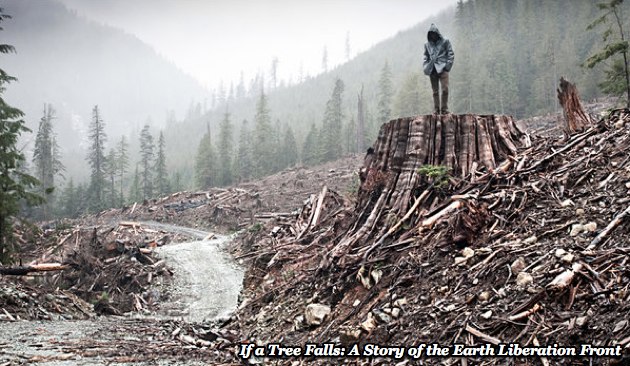
All of these docs feature subjects with incredibly deep, rich back stories, from the War in Afghanistan to unsolved murders to artistic legacies. What did you want to communicate about the bigger pictures against which you told these individual tales?
BERLINGER: Paradise Lost 3: Purgatory had the specific goal of shining a spotlight on the wrongful conviction of three individuals, but the larger message of the film is the utter immorality of the death penalty. In this particular legal case, we see how Damien Echols, an innocent man, could have been so easily put to death years ago if not for the activism and fundraising by tens of thousands around the world who were inspired by our earlier films on the subject. This should teach us that if even one innocent person can so easily be put to death because of human error and intransigence, then there can be no death penalty, because there is no moral justification for killing an innocent person.
CURRY: It's an interesting year that seems almost like it's been curated — there's an art film, a war film, a crime film, a sports film, and I guess we are the political film. I was above all interested in the personal story: how did a guy like Daniel McGowan — who had grown up in Rockaway, Queens, whose dad was a NY cop, who was a business major in college — wind up joining a radical environmental group considered the "number one domestic terrorist group" by the FBI? What was that like for his sister and his dad and his wife when he was arrested? But there were larger political issues that drove our interest as well: How do we define terrorism? Is "one person's terrorist another person's freedom fighter," as the police captain says in the film? What happens when people feel that their voices aren't being heard? It's the personal story that grounds the movie, but the larger political questions make it something other than a human-interest story.
LERNER: The fact that our countries have been at war for over 10 years in Afghanistan is not something that resonates very deeply with most people on a daily basis. Danfung Dennis was determined to use this film to try and shake people from their indifference and understand a conflict that has caused so much pain and damage on all sides.
LINDSAY: This is always a difficult question for me to answer. On a personal level, there are a lot of things that really resonate with me, but I am always cautious of saying that is what everyone else should take away from the film. TJ and I always hoped this film would be the beginning of a larger conversation about class and how closely that relates to race in much of our country, but we never wanted to be didactic. We don't know the answers and we don't want to pretend like we do. Having said that, we do always work from themes and we make sure every scene in the film speaks to those sub-textual themes. So we are making very deliberate choices in what we present, but we are trying to present them in a way that spurs a conversation, instead of trying to end it.
MARTIN: Honestly, we set out to make more of a "coming of age" story and less an "issues based" film. With that said, we don't shy away from the clear socio-economic challenges of the North Memphis community. We wanted the audience to go on an intimate and more humanistic journey so that it would hopefully inspire a greater dialogue about race and class. This film will never be the authority on these issues.
WENDERS: I felt there was a universal language out there that showed itself for the very first time in Pina Bausch's work, a language of beauty and of healing that didn't need any words. I wanted to share this with as many people as possible.
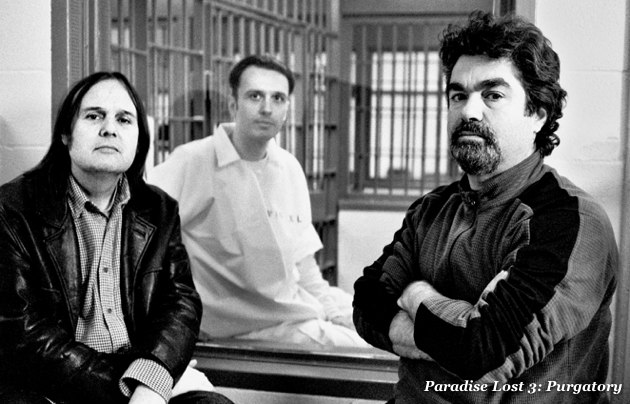
How comfortable are you with the competitive culture around the Oscars? Particularly with the campaign/short-list stage that can get a little ruthless, even for the relatively civil world of documentaries?
BERLINGER: I don't agree that the world of documentaries are any more or less civil than the world of feature films. Just look at how the filmmakers of another film about the West Memphis case blocked our access to certain characters that we introduced them to through our documentaries, despite their good intentions for the West Memphis Three. However, I have been very impressed with how civil the interaction has been between us and our fellow nominees, for example, at the recent Academy Nominee luncheon in Los Angeles. Those fellow nominees whom I have been able to meet are, like myself, just so happy just to be nominated, and we have all genuinely wished each other well. In short, I guess if a filmmaker wants to be recognized for an Oscar, there must be competition, but it doesn't have to be ruthless. The recent rule changes put into effect this year curtailing the lavish parties and the new documentary rules to be put into place next year that open up the shortlisting process to the entire documentary branch instead of a smaller committee I think will help level the playing field and ameliorate some of the campaign issues for documentaries. However, next year's other rule change in which the entire Academy votes on the five nominated documentaries I fear will raise some cost issues that concern me, especially for social issue documentarians who are already often working with constrained budgets.
CURRY: I don't really feel like it is ruthless. Everyone wants their film to be noticed, but I've never heard of doc filmmakers trying to hurt each others' films, like you hear about in the fiction world. It's a pretty small community, and everyone struggles to get their films made and seen, and I think most people appreciate each others' work.
LERNER: Well, we are pretty civilized folks in the documentary world — of course we'd all like our films to win if we're lucky enough, but I think we're also so proud to be nominated. May the best man (and it is, sadly, all men) win!
LINDSAY: Not comfortable with it at all. I really don't even understand how you choose a "best" film. It is impossible. I think all the campaigning and positioning proves that. I will say I have had a chance to spend some time with Marshall Curry and I spoke with Danfung Dennis at the Nominees Luncheon, and in no way did I feel any competitiveness between us. In fact, I was just excited to talk to them because I loved their films so much. Having said that, I am not naive to what a nomination or win means for a film, but I will let other people worry about that.
MARTIN: I'm not at all comfortable with the competitive culture of the Oscars. This is not a sport. It's art. Overall it seems to defeat the purpose of what creativity is supposed to be — entertainment, self expression, etc. I'm not sure how you can judge how one film is better than the other. Having said that, there is no doubt in my mind that is an important moment in our lives and careers, and I will cherish every moment of it.
WENDERS: I don't have a very competitive nature but I think there are civilized rules behind the Oscars, and I am glad to stick to them.

Your film has the backing of a conventional distributor, but more and more documentary filmmakers are choosing to self-distribute. What's your take on the advantages/disadvantages of doing it yourself, especially at this time of year?
BERLINGER: Bruce Sinofsky and I began our career as a self-distributors with Brother's Keeper in 1992, and that was probably — financially speaking — my most successful of my five theatrically released documentaries during the last two decades. But, it was a full time job for a year. So, if a filmmaker is willing to put in the time, it's a great way to learn about distribution and negotiate on the next film from a position of knowledge and strength.
CURRY: I think self-distribution is a smart way to go much of the time. I think usually the money nets out better, and you have more control over every detail. But that's also the downside — you have to deal with every detail. Oscilloscope was a great partner — they shot straight with me from the beginning about their expectations for the film. They made a beautiful DVD that feels like a Criterion collectable. They did all of the theatrical bookings and collection, hired a terrific publicist, Jessica Edwards, and listened to me when I had opinions. All of that was going on at the same time that Racing Dreams was preparing for our PBS broadcast (on POV, Feb 23), and I was negotiating new second-window deals for Street Fight. And I've started shooting a new film about the boxer Lennox Lewis. There's no way I could have juggled all of that if we had been self-distributing the film.
LERNER: Every film is different, but I certainly would not have chosen to self-distribute this particular film. Our distributor, Docurama Films, has done such a great job and have supported the film in so many ways that I'm not sure what we'd have done without them.
LINDSAY: Oh man, this is difficult. You know, I don't think I can intelligently answer that because I haven't been doing this long enough. That said, I can tell you we made our film to be watched in a theater, so I am ecstatic that we are getting the release that we are, and I am not sure we would have been able to figure this out on our own.
MARTIN: I don't think that I've been doing this long enough to contribute any great insight on the matter. However, I do know that without the support of our distributor there's no way that this film would get as wide of a release as it's getting. For me it's really important that audiences can access the film. If we self-distributed the film, we would not have any where close to the same reach for accessing potential audiences. What's more, I've noticed from colleagues who have self-released their work that it is a full time job even years after the film has been complete. I'm more interested in making a wide array of good work versus running a home-grown distribution company.
WENDERS: There's nothing better that having a distributor standing behind your film and certainly preferable to doing it yourself in your own kitchen. Then again, the Internet gives you a whole new access to reach an audience out there...
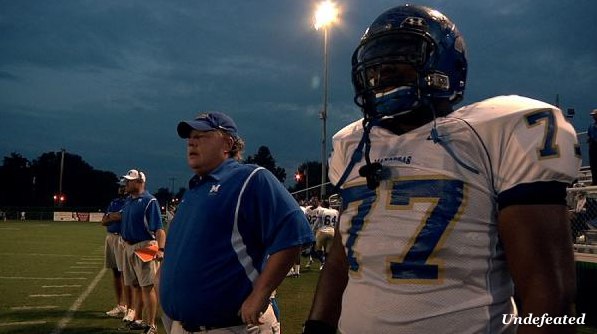
Who is accompanying you to the Oscars?
BERLINGER: My wife, Loren, who I married shortly before we began shooting the first Paradise Lost film in 1993. She has literally been my support system and we have raised a family throughout the two decades that we have covered this story, so I can think of no one more appropriate to share the evening with. My kids will be with us, too, but watching on TV from the hotel. And of course, co-director Bruce Sinofsky and his wife Florence will be attending with us.
CURRY: Sam Cullman and I are taking our wives, and also a few of folks who worked on the film. Matt Hamachek, who shares the writing/editing credit with me will be there with his wife. Bill Gallagher, our amazingly dedicated line producer who sometimes spent the night on the floor of the office when we were cramming to finish for Sundance. Also, Steve Bannatyne, our Executive Producer, and David Fenkel from Oscilloscope.
LERNER: In addition to myself and Danfung Dennis, the protagonists of the film, Sgt. Nathan Harris and his wife Ashley, are coming, as are: Danfung's better half, Casey Brown; our co-producer Martin Herring from Roast Beef; Dan Cogan from Impact Partners; Karol Martesko-Fenster from Thought Engine; Gernot Schaffler from Sabotage Films, Susan Margolin from New Video/Docurama Films. And last but not least, Fiona Otway &mdash the inspired, incredible editing genius who, together with Danfung, is responsible for creating such a great film.
LINDSAY: Well, I don't know who my official date will be yet, but it will be one of our producers. TJ, Rich and myself are nominated and we are taking the three other producers: Seth Gordon, Ed Cunningham and Glen Zipper. Seth and Ed are really tall, so I may just claim Glen as my date so I don't look too short in the pictures.
MARTIN: We would also like to take our mothers so if you have any leads on additional tickets please hit us up!
WENDERS: My wife, of course, and a whole number of crew members who just booked their own flights from Germany to Los Angeles — we couldn't keep them away.
How do you follow this? What's your next project?
BERLINGER: I just finished a new film about the 25th anniversary of Paul Simon's Graceland album detailing the record's musical achievement and the political turmoil it sparked when Simon was accused of breaking the U.N Cultural Boycott designed to end the apartheid regime in South Africa. The film, entitled Under African Skies, just premiered at Sundance and I am spending the spring making sure the film finds it place in the world. I am also beginning the sixth season of Iconoclasts, a TV series I helped create for the Sundance Channel that I produce and direct. I am also looking forward to a nice long nap after the Oscars.
CURRY: I have a few projects that I'm developing and one that I've started shooting about the former heavyweight champion Lennox Lewis.
LERNER: Roast Beef Productions are in the edit with Havana Marking's new epic heist movie Smash and Grab: The Story of the Pink Panthers — it's a film about the world's most successful diamond thieves — and Danfung Dennis is working hard on his amazing photo app — Condition ONE — that anyone interested in the future of photography should check out.
LINDSAY: We are going to remake Citizen Kane shot for shot.
MARTIN: You don't follow up. You retire. I've decided to work on my infamous electronic album and become a rock star next.
WENDERS: I'm preparing a family drama with the optimistic title, Everything Will Be Fine.
Follow S.T. VanAirsdale on Twitter.
Follow Movieline on Twitter.

Comments
Sorry but it's a joke that Undefeated and Pina are nominated, period.
#TeamPurgatory
I'm with you re Pina in particular. I deeply respect Wim Wenders and admire the film and the concept, but if that's a documentary, then I'm Rick Santorum.